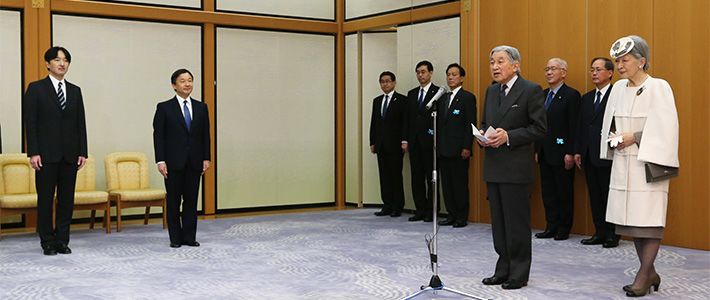
Japanese Media Reports on Emperor Akihito’s Wish to Abdicate
Politics Society- English
- 日本語
- 简体字
- 繁體字
- Français
- Español
- العربية
- Русский
On the evening of July 13, NHK and other Japanese media sources began reporting that Emperor Akihito has expressed a wish to abdicate and relinquish his position to Crown Prince Naruhito. According to the reports, Imperial Household Agency and other government sources claim that the emperor would like to abdicate within the next few years.
No Provisions for Abdication
There are no provisions concerning abdication in the Imperial House Law, which only provides for the throne to pass to a new emperor upon the death of the previous one. This makes it necessary to amend the law or enact some other special legislation to allow a sitting emperor to step down while still alive. The Mainichi Shimbun stated, “The government respects the will of the emperor, and the prime minister and cabinet have already started discussion of the required legal preparations.”
Meanwhile, the Asahi Shimbun reported comments from Imperial Household Agency insiders that “the agency has not discussed any specific arrangements. The emperor’s will is one thing, but making it happen is something else entirely.” It notes that some people related to the imperial household take a negative view of the possibility of abdication, and that there are major hurdles in the way of passing an amendment.
Reduced Duties
Emperor Akihito is now 82. In 2012, he underwent coronary artery bypass surgery, but he still performs many official duties, including functions set forth in the Constitution and various domestic and international visits. Over the past several years, the IHA has lightened the burden on Emperor Akihito by not asking him to make speeches at some ceremonies and reducing the number of his audiences with guests from abroad.
Under the Constitution and the Imperial House Law, if the emperor is unable to perform his duties due to health problems, the crown prince, empress, or other member of the imperial family can become the regent and take on these tasks. When Emperor Taishō (1879–1926) was sick in his later years, Crown Prince Hirohito (1901–89), the future Emperor Shōwa, became regent.
NHK reported: “Emperor Akihito believes that ‘the emperor should be someone able to fully perform symbolic duties as defined by the Constitution’ and that it is undesirable to have an emperor with reduced official duties or who is represented by a substitute due to advancing age.”
The Heisei era began with the accession of Emperor Akihito to the throne in 1989. If he abdicates, it will come to an end and a new era will begin—although this process, too, will need to be defined in an amended law.
(Originally written in Japanese and published on July 14, 2016. Banner photo: Before making an official visit to Palau, Emperor Akihito gives a speech at Haneda Airport, Tokyo, on April 8, 2015. © Jiji.)